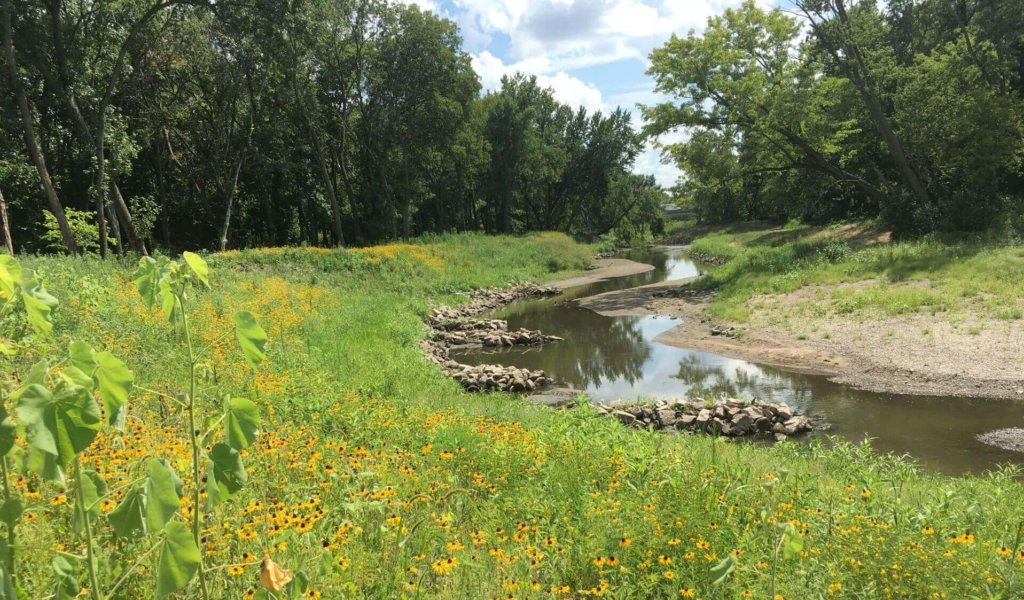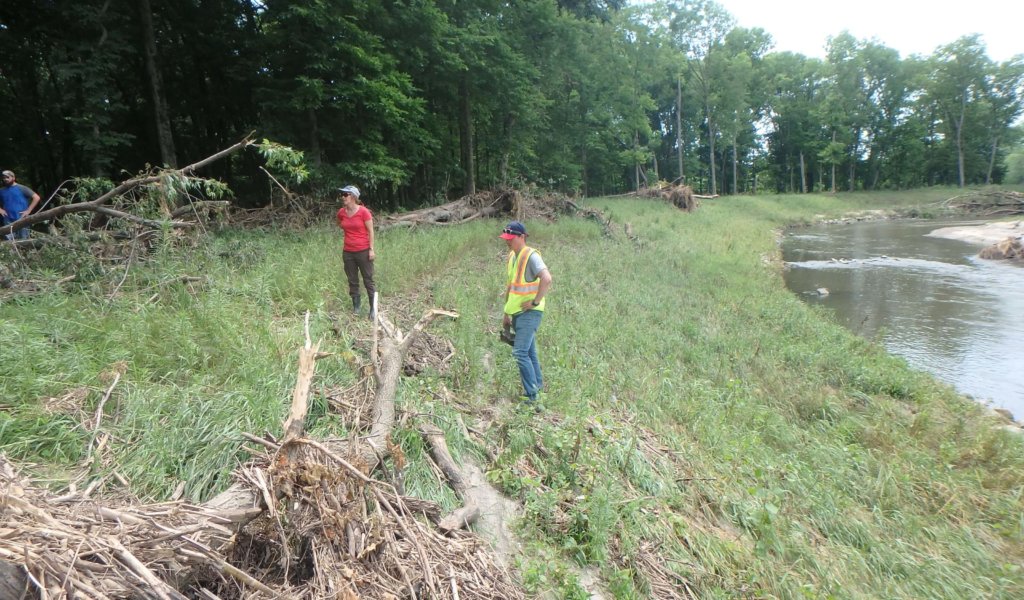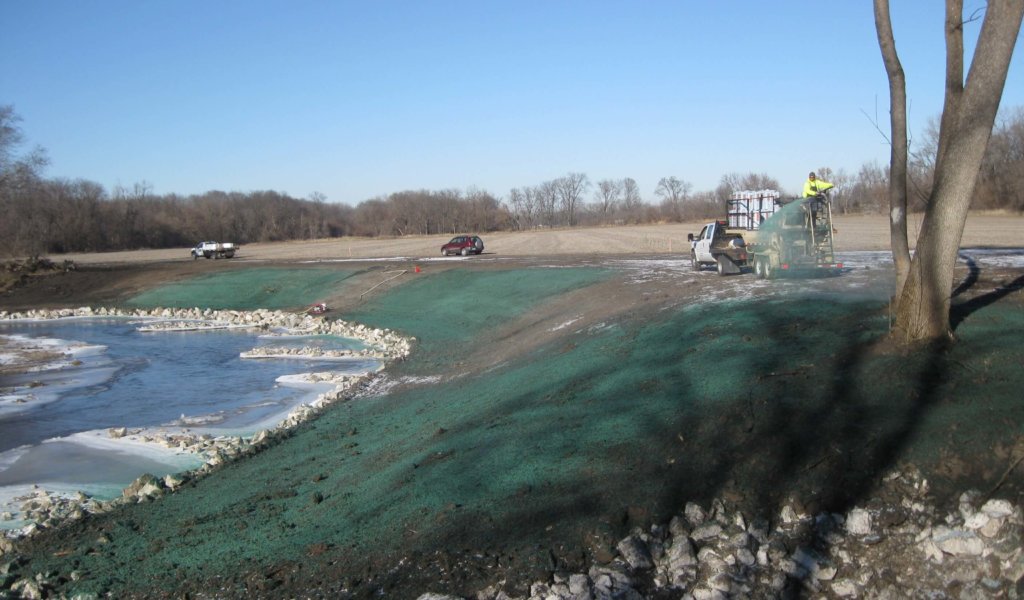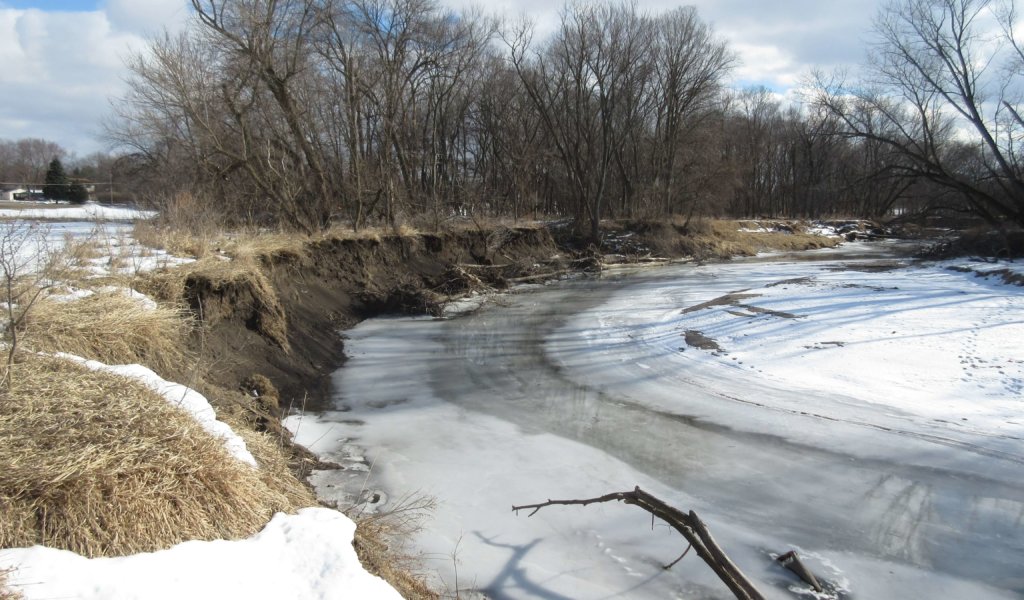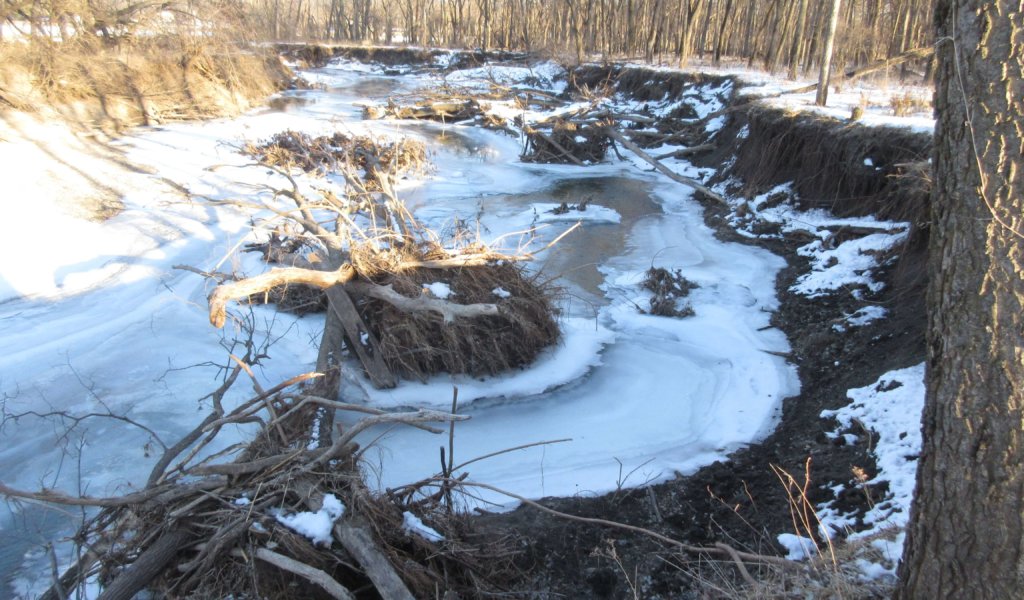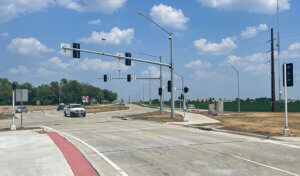
Improving Ecological Stream Functions & Habitat
The WRA Fourmile Creek Improvements-North of Broadway project protects vital infrastructure while fostering improved ecological functions and habitat. Traditional infrastructure protection with riprap at single bends was abandoned because of the low ecological value. Generally speaking, the ecological value of an organism, natural resource, activity, and other components of natural ecosystems are defined by the benefits they provide to support native life.
Integrating ecological lift techniques within this complex project has garnered a 2019 Engineering Excellence Honor Award from the ACEC-IA.
This project began when streambank erosion at several Fourmile Creek locations put sanitary sewer infrastructure at risk. Snyder & Associates’ experience with environmental engineering, fluvial processes, and stream restoration prompted the Des Moines Metropolitan Wastewater Reclamation Authority (WRA) to seek our assistance on a creative solution to address the issue. Collaboration was essential in creating a vision for the project as well as identifying project priorities and opportunities.
By reading the river and using natural channel design concepts, this project transformed an environmental liability into an improvement that:
- Boosts water quality through sediment loading reductions and vegetative filtering of nutrients
- Strengthens the safety of stable/non-vertical banks
- Reduces the risk of downstream flooding
- Creates a user-friendly recreational environment
- Enhances the aquatic habitat for fish and other living organisms
Funding Assistance Strengthens Project Impact
WRA embraced the opportunity to leverage SRF Sponsored Project funding associated with their infrastructure improvement loans. As a result, they expanded a limited bank stabilization project to protect their sanitary sewer infrastructure into a comprehensive stream restoration approach that benefits longer reaches.
Through several applications, we helped the WRA secure $4.2 million in funding assistance to leverage their limited traditional funds. We were also able to successfully coordinate with multiple agencies and partners to facilitate right-of-way acquisition and meet funding requirements. Over 8,000 feet of stream restoration was prioritized in three Fourmile Creek reaches—north of Broadway Avenue, north of Euclid Avenue, and south of University Avenue—to reduce severe bank erosion and channel degradation, and protect sanitary sewer infrastructure.
Stream Restoration Process
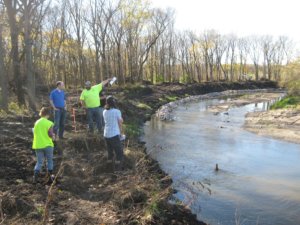
Project partners observe construction progress during rock toe installation. Specific design and construction methods were used to help minimize the impact to nearby trees.
Throughout the project, the WRA was engaged in every aspect including creating the vision, prioritizing improvements, and exploring funding opportunities. This included the design and permitting phases, as well as the details of easement acquisition and negotiations. Snyder & Associates’ design team provided concepts and discussed using a stream restoration approach with the WRA (instead of just placing riprap to stop bank erosion near the sanitary sewer infrastructure).
Alternatives were explored based on realistic construction costs so the WRA could make informed decisions. Many of these decisions were made during the initial planning phase of the project while working on the conceptual design and funding applications.
Intimate knowledge of the watersheds combined with previous hydrologic and hydraulic modeling and observation of 2008 and 2010 flood impacts contributed to sustainable design solutions. Appropriate solutions had to account for a powerful, meandering alluvial stream that transports significant sediment load. Extreme events can cause significant channel changes due to stream power, debris/log-jams, erosion, and sediment deposition.
The Broadway project was completed in 2017, restoring 2,550 feet of stream length and over 3,100 feet of bank for a stream draining 85 square miles at this location. Cost-effective stream restoration was achieved using natural channel design techniques that directly improve water quality, stabilize streambanks/channel, reduce sediment delivery, and uplift the ecological functions of aquatic and riparian habitat.
The project was also designed for sustainability and no increase in flood risk. The techniques that were used included toe rock protection integrated with bendway weirs, and shaping low bankfull “floodplain benches” and stable slopes with native vegetation buffers. Additional measures included establishing permanent easements and expanding Polk County’s adjacent conservation area. The completed improvements have helped diversify stream habitat and wildlife access to water.
Multidisciplinary Expertise Guides Stream Restoration
We provided crucial planning and design services to maximize the environmental benefits and guide project success. Our right-of-way services helped acquire necessary easements while expanding the Polk County conservation area through relationship-building negotiations. Other services provided included stream assessments, topographic surveys, wetland delineations, endangered species assessments, and floodplain analyses. The project required permitting, including 404 permitting, through the U.S. Army Corps of Engineers and floodplain permitting through the Iowa DNR.
Dedicated construction administration and coordination helped preserve and minimize the impact to adjacent woodlands and other natural resources while preventing the potential for expensive sewer relocations. It also maximized other benefits such as water quality, aquatic habitat, and stream access for wildlife and recreation.
Value Engineering Provides Major Cost Savings
The original budget estimate for the Broadway project was $1,064,602. A competitive bid process yielded five lower bids out of seven. The lowest bid was $895,865.
Through value engineering support during construction—and reducing the need for temporary erosion control measures by proceeding directly to permanent seeding of native vegetation—the final construction cost was just under $653,000. This amounted to a savings of approximately $243,000 as compared to the original construction contract. The project was successfully completed under budget while meeting project restoration goals and protection of sanitary sewer infrastructure. As a result, more funds will be available for other priority Fourmile Creek stream improvements.
